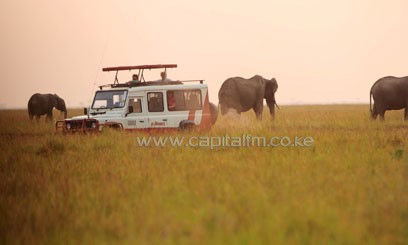Speaking at a press conference celebrating KTB’s best tourism board in Africa award from the World Travel Awards earlier this month, KTB Managing Director Muriithi Ndegwa admitted that 2012 has been a difficult year for the industry due to insecurity, but revealed that there may have seen significant growth in domestic tourism. NAIROBI, Kenya, Dec 21 – The Kenya Tourism Board (KTB) is urging stakeholders and the government to focus on keeping Kenyans safe during the festive season as arrival numbers have fallen by more than 20 percent in 2012 due to insecurity.
NAIROBI, Kenya, Dec 21 – The Kenya Tourism Board (KTB) is urging stakeholders and the government to focus on keeping Kenyans safe during the festive season as arrival numbers have fallen by more than 20 percent in 2012 due to insecurity.
“We’ve had a very challenging year, not just because of some of the incidences we’ve had locally, but also because of our reliance on some of the traditional markets that have gone through some very challenging time,” he said.
“This has impacted our sector negatively in terms of arrivals coming into this country. However we’ve had positive growth from the emerging countries such as countries in Asia, as well as the regional countries that neighbour Kenya,” he explained.
The number of tourists arriving in Mombasa dropped to 121,472 between January and August this year, compared to 156,521 in the same period last year but Ndegwa said that reports from hoteliers on the bookings for December indicate a high number of domestic tourists.
The CEO of the Kenya Association of Hotel Keepers and Caterers Mike Macharia explained what players in the sector are doing to address the security challenges, but emphasised that it must be a collaboration between all the stakeholders involved.
“What the businesses have put in place are safety measures to counter the terrorism threat and this is also seen in shopping malls, public areas and churches,” he said.
“The threat of terror is there and it’s real, but the issue is what we’ll do about it. It’s not a function of government alone, it’s a function of a partnership between the businesses and the government,” he added.
Last year, Britain, the United States and Australia issued Kenya-related travel advisories to their citizens after a British tourist was killed near the coastal resort of Lamu.
Kenyan troops later entered Somalia to root out the al Qaeda-linked militant group blamed for attacks in the area, which triggered revenge grenade and gun attacks in the capital Nairobi, and the port city of Mombasa.
Ndegwa acknowledged the security concerns, but urged Kenyans to remain vigilant saying, “Our appeal to Kenyans is that we all maintain peace ahead and during the general election and to embrace tourism by sampling our diverse tourism products spread across the country.”
Ndegwa explained that over the last two years, KTB has been receiving impressive results following the successful implementation of product and market diversification strategy, adoption of new promotion strategies, increased advertising campaigns and partnerships with major tour operators worldwide couple with collaborative engagement with the private sector.
“In line with our product diversification strategy, we have continued to market our tourism products including and not limited to sports, Meetings Incentives Conferencing Exhibitions (MICE), eco-tourism, culture, water sports, agri-tourism and birding among others so as to satisfy different sets of clientele,” he said.
“We will be launching a global consumer targeted campaign in key overseas markets to continue to create the buzz about Kenya and reposition the destination in the eyes of the consumers during this time when the country is experiencing challenges,” he revealed.
Alongside tea and horticulture, tourism is one of Kenya’s major foreign currency earners and raked in Sh98 billion ($1.18 billion) last year, just shy of its Sh100 billion target, and up from Sh74 billion in 2010.
“We are in partnership with players in the industry. For example; we have sponsored the recent ‘Talii na Uchumi’ campaigns to push domestic tourism and we’ve partnered with hoteliers, tour operators, travel agents and airlines for affordable packages,” he said.


































